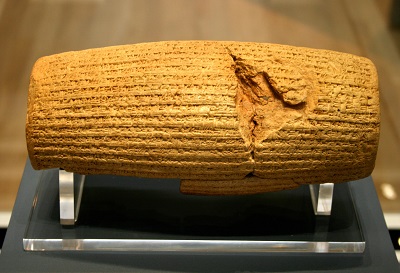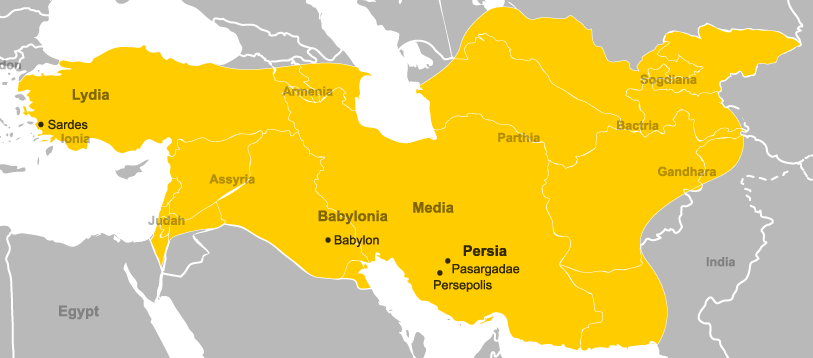This series has seven» easy 5 minute installments. This first installment: After the Fall of Assyria.
Introduction
The defeat of the Assyrians at the hands of the three allies Babylonia, Media, and Lydia reminds one of the war against the Nazis. Their victory left the allies as the major powers. The comparison falls apart when we consider that one lifetime later, the Persians began an empire while conquering the victors.
This selection is from A History of Greece by George Grote published in 1856. For works benefiting from the latest research see the “More information” section at the bottom of these pages.
The great George Grote was the foremost historian of ancient Greece in the nineteenth century.
Time: 600 – 530 BC
Place: Near East

CC BY-SA 4.0 image from Wikipedia.
The Ionic and Aeolic Greeks on the Asiatic coast had been conquered and made tributary by the Lydian king Croesus: “Down to that time (says Herodotus) all Greeks had been free.” Their conqueror, Croesus, who ascended the throne in 560 B.C., appeared to be at the summit of human prosperity and power in his unassailable capital, and with his countless treasures at Sardis. His dominions comprised nearly the whole of Asia Minor, as far as the river Halys to the east; on the other side of that river began the Median monarchy under his brother-in-law Astyages, extending eastward to some boundary which we cannot define, but comprising, in a south-eastern direction, Persis proper or Farsistan, and separated from the Kissians and Assyrians on the east by the line of Mount Zagros (the present boundary-line between Persia and Turkey). Babylonia, with its wondrous city, between the Uphrates and the Tigris, was occupied by the Assyrians or Chaldaeans, under their king Labynetus: a territory populous and fertile, partly by nature, partly by prodigies of labor, to a degree which makes us mistrust even an honest eye-witness who describes it afterward in its decline — but which was then in its most flourishing condition. The Chaldean dominion under Labynetus reached to the borders of Egypt, including as dependent territories both Judaea and Phoenicia. In Egypt reigned the native king Amasis, powerful and affluent, sustained in his throne by a large body of Grecian mercenaries and himself favorably disposed to Grecian commerce and settlement. Both with Labynetus and with Amasis, Croesus was on terms of alliance; and as Astyages was his brother-in-law, the four kings might well be deemed out of the reach of calamity. Yet within the space of thirty years, or a little more, the whole of their territories had become embodied in one vast empire, under the son of an adventurer as yet not known even by name.
Continued below the map.

CC BY-SA 3.0 image from Ancient History Encyclopedia.
The rise and fall of oriental dynasties have been in all times distinguished by the same general features. A brave and adventurous prince, at the head of a population at once poor, warlike, and greedy, acquires dominion; while his successors, abandoning themselves to sensuality and sloth, probably also to oppressive and irascible dispositions, become in process of time victims to those same qualities in a stranger which had enabled their own father to seize the throne. Cyrus, the great founder of the Persian empire, first the subject and afterward the dethroner of the Median Astyages, corresponds to their general description, as far, at least, as we can pretend to know his history. For in truth even the conquests of Cyrus, after he became ruler of Media, are very imperfectly known, while the facts which preceded his rise up to that sovereignty cannot be said to be known at all: we have to choose between different accounts at variance with each other, and of which the most complete and detailed is stamped with all the character of romance. The Cyropaedia of Xenophon is memorable and interesting, considered with reference to the Greek mind, and as a philosophical novel. That it should have been quoted so largely as authority on matters of history, is only one proof among many how easily authors have been satisfied as to the essentials of historical evidence. The narrative given by Herodotus of the relations between Cyrus and Astyages, agreeing with Xenophon in little more than the fact that it makes Cyrus son of Cambyses and Mandane and grandson of Astyages, goes even beyond the story of Romulus and Remus in respect to tragical incident and contrast. Astyages, alarmed by a dream, condemns the newborn infant of his daughter Mandane to be exposed: Harpagus, to whom the order is given, delivers the child to one of the royal herdsmen, who exposes it in the mountains, where it is miraculously suckled by a bitch. Thus preserved, and afterward brought up as the herdsman’s child, Cyrus manifests great superiority, both physical and mental; is chosen king in play by the boys of the village, and in this capacity severely chastises the son of one of the courtiers; for which offense he is carried before Astyages, who recognizes him for his grandson, but is assured by the Magi that the dream is out and that he has no further danger to apprehend from the boy — and therefore permits him to live. With Harpagus, however, Astyages is extremely incensed, for not having executed his orders: he causes the son of Harpagus to be slain, and served up to be eaten by his unconscious father at a regal banquet. The father, apprised afterward of the fact, dissembles his feelings, but meditates a deadly vengeance against Astyages for this Thyestean meal. He persuades Cyrus, who has been sent back to his father and mother in Persia, to head a revolt of the Persians against the Medes; whilst Astyages — to fill up the Grecian conception of madness as a precursor to ruin — sends an army against the revolters, commanded by Harpagus himself. Of course the army is defeated — Astyages, after a vain resistance, is dethroned — Cyrus becomes king in his place — and Harpagus repays the outrage which he has undergone by the bitterest insults.
Such are the heads of a beautiful narrative which is given at some length in Herodotus. It will probably appear to the reader sufficiently romantic; though the historian intimates that he had heard three other narratives different from it, and that all were more full of marvels, as well as in wider circulation, than his own, which he had borrowed from some unusually sober-minded Persian informants. In what points the other three stories departed from it we do not hear.
| Master List | Next—> |
More information here and here and below.
We want to take this site to the next level but we need money to do that. Please contribute directly by signing up at https://www.patreon.com/history
Leave a Reply
You must be logged in to post a comment.